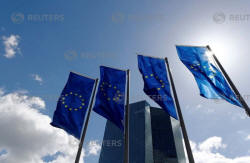ECB minutes highlight fears for growth from trade war
 Send a link to a friend
Send a link to a friend
 [October 11, 2018]
FRANKFURT (Reuters) - Global
trade tensions could slow euro zone growth further, and European Central
Bank policymakers debated last month whether to downgrade their risk
assessment, minutes of their September meeting showed on Thursday. [October 11, 2018]
FRANKFURT (Reuters) - Global
trade tensions could slow euro zone growth further, and European Central
Bank policymakers debated last month whether to downgrade their risk
assessment, minutes of their September meeting showed on Thursday.
But policymakers ultimately decided that the domestic economy was
showing considerable resilience, so risks to growth remained balanced,
even if some argued that the factors behind the recent slowdown may not
be temporary, the ECB said in the accounts of the Sept 13 meeting.
The ECB kept policy unchanged as expected last month, staying on track
to wrap up a 2.6 trillion-euro ($3 trillion)bond purchases scheme this
year and raise interest rates next autumn, even as it warned that risks
from protectionism were growing.

"A remark was made that some of the factors behind the (downward growth)
revisions might not be entirely of a transitory nature," the minutes
showed. "It was also argued that there could be larger spillovers from
weaker external demand to domestic demand."
Still, while some policymakers argued that the case could be made for
downgrading the risk assessment, there was agreement that the underlying
strength of the economy would mitigate the downside risks to activity.
Rate setters also concluded that the actual impact of trade tensions has
been limited so far, even if there could still be an impact over time.
"High-frequency indicators had stabilized and remained at elevated
levels, underlining the overall robustness of economic activity," chief
economist Peter Praet told policymakers, according to the minutes.
With years of unprecedented stimulus are finally lifting inflation and
the ECB has been dialing back support, but only by the smallest of
increments, fearing that bigger moves risked unraveling its work.
[to top of second column] |

European Union flags flutter outside the European Central Bank
headquarters in Frankfurt, Germany, April 26, 2018. REUTERS/Kai
Pfaffenbach/File Photo

While the ECB has not explicitly pledged any rate hikes, policymakers, including
Praet, have argued that they were comfortable with market expectation for a
small increase in the fourth quarter of 2019, followed by only small and
infrequent moves.
Policymakers also concluded that domestic cost pressures continued to build and
broaden, indicating that inflation would rise, moving back towards the bank's
target of almost 2 percent after undershooting it for over five years.
A slowdown in growth and the rising threat of protectionism has also been adding
to the ECB's caution. Some policymakers have warned that external risks, ranging
from trade tensions to an emerging market shakeout and Brexit, could derail
global growth.
Indeed, earlier this week the International Monetary Fund cut its global
economic growth forecast for this year and next, saying that the U.S.-China
trade war was taking a toll and emerging markets were struggling with tighter
liquidity and capital outflows.
($1 = 0.8660 euros)
(Reporting by Balazs Koranyi, editing by Larry King)
[© 2018 Thomson Reuters. All rights
reserved.] Copyright 2018 Reuters. All rights reserved. This material may not be published,
broadcast, rewritten or redistributed.
Thompson Reuters is solely responsible for this content.
 |